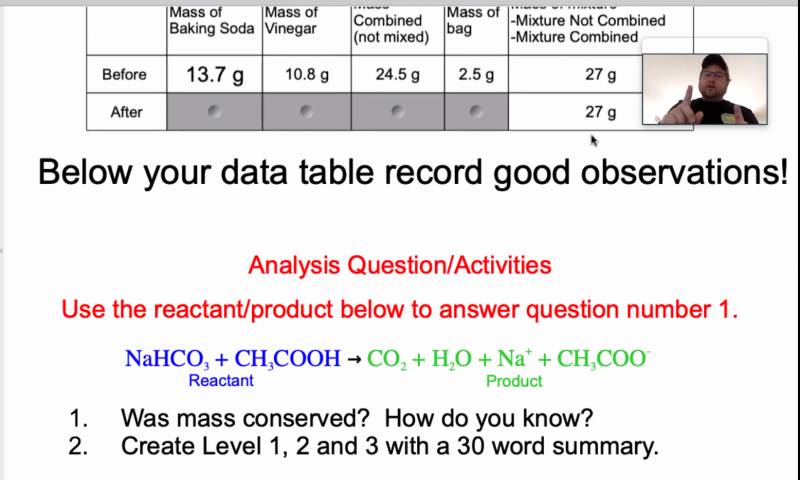Cape teacher holds science experiment on Zoom
Cape High science teacher Patrick Kilby recently turned his kitchen into a lab to conduct an experiment about the law of conservation of mass.
His 10th-grade physical science class Zoomed in to participate in the lesson, part of a unit on energy, and shared journal entries depicting how energy can change forms or transfer but cannot be destroyed.
“Now, how can I use baking soda, vinegar and a sealable plastic bag to demonstrate the law of conservation of mass?” Kilby asked.
Before he proceeded with the experiment, students brainstormed hypotheses. “There are no right or wrong answers here,” Kilby told them, and he gave them the length of two songs to write their statements.
Then, Kilby measured the mass of baking soda, vinegar and the bag. When he combined elements in the bag, the mixture fizzed and bubbled, demonstrating a change occurred, while the mass remained constant.
In an email after the class, Kilby said planning lessons for online learning has advantages and disadvantages.
“I am able to record and post my Zoom lessons on Schoology for students who were not present during my live lesson,” he said. “This is a positive, as the material is there for them, but it doesn’t give the students the ability to ask me questions and get instant feedback.”
In a standard lesson, students get instant feedback; any students who were absent have a one-on-one conversation with Kilby when they return and receive materials to complete the assignment.
“Obviously this is a disadvantage with online learning, as we are not able to have this interaction, and I for one certainly took this for granted,” Kilby said.
Kilby said he has revised his teaching methods through trial and error since remote learning began April 6.
“After the first two weeks, I had to reevaluate my lessons in regard to length,” he said. “I felt as though if I was giving direct instruction for more than 20 minutes, I would be losing the students’ interest, whereas in the classroom, I have the freedom to move about within the lesson and layer it with different activities.”
Kilby said he began incorporating music into his online lessons to gauge the length of activities. With Zoom lessons, he said, he never knows how many students will show up.
“In my classroom, I would have upwards of 30 students, whereas I have anywhere from seven to 10 students show up for my online lessons,” he said. “As a science teacher, I feel as though if I didn’t provide the students with some type of hands-on learning, I would be doing them a disservice.”
For interactive learning, Kilby has used University of Colorado PHET Simulations, in which students visited an online skate park and applied the concept of kinetic and potential energies. NASA/Wallops Island also provided an in-home lab for students to model Newton’s third law of motion – for every action or force, in nature there is an equal and opposite reaction – by creating a car to model momentum, using a balloon to power their car.
“They had to take into consideration that the more mass the car has, the more force is needed to propel their car,” Kilby said.
Kilby said he has also incorporated journaling, an AVID strategy, into his everyday teaching practice.
“Everything they do is completed in their interactive science journal,” he said. “I am able to have the students access their journals at home just as they did in class.”
Kilby said he provides a template of the lesson for students to re-create in their journals.
“The setup is simple,” he said. “When they open their journal, they will have a blank right page and a blank left page. Anything that is put on their right page is material I want them to learn. Anything that is input on their left page is the activity they will complete to process the information that is on their right page.”
To keep parents informed, Kilby sends a weekly email stating what was covered in class, any assignments and what will be covered in the next Zoom lesson. Parents can also access their children’s Schoology accounts to monitor their progress.




















































